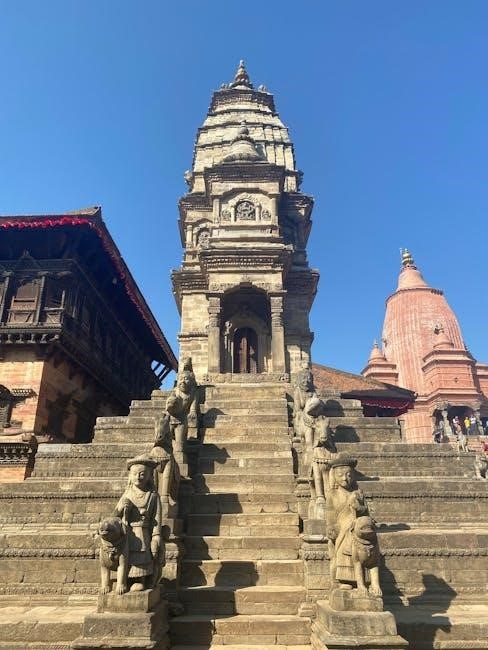The Ashta Lakshmi Stotram is a revered hymn dedicated to Goddess Lakshmi, celebrating her eight divine forms․ It is a powerful invocation for spiritual growth and material prosperity, offering devotees a path to connect with her blessings․ Widely available in PDF formats, this sacred text is accessible in Sanskrit, English, and other languages, making it a cherished resource for global worshippers seeking divine grace and balance in life․
Overview of the Hymn
The Ashta Lakshmi Stotram is a devotional composition dedicated to Goddess Lakshmi, highlighting her eight divine forms․ This hymn serves as a spiritual tool to connect with her blessings, offering both material and spiritual prosperity․ Composed in Sanskrit, it is widely available in PDF formats, including translations in English and other languages, making it accessible to global devotees․ Each verse praises a specific form of Lakshmi, such as Adi Lakshmi, Dhana Lakshmi, and Vijaya Lakshmi, emphasizing her role in granting wealth, knowledge, and victory․ The stotram is cherished for its ability to inspire devotion and balance in life, aligning with Hindu spiritual traditions while remaining adaptable for modern worshippers seeking divine grace․
Significance of the Eight Forms of Lakshmi
The eight forms of Lakshmi embody her diverse blessings, from wealth and knowledge to courage and progeny․ Each form symbolizes a unique aspect of her divine grace, ensuring a balanced life․ Adi Lakshmi represents primordial energy, Dhana Lakshmi wealth, Vidya Lakshmi knowledge, Dhanur Lakshmi courage, Santaan Lakshmi progeny, Vijaya Lakshmi victory, Dhairya Lakshmi strength, and Gaja Lakshmi prosperity․ Together, they offer comprehensive blessings, guiding devotees toward spiritual and material harmony․ The stotram is a powerful prayer to invoke these blessings, reflecting Lakshmi’s universal role in nurturing life’s multifaceted journey․

The Eight Forms of Lakshmi
The Ashta Lakshmi Stotram glorifies Goddess Lakshmi’s eight divine forms, each embodying unique blessings for devotees seeking wealth, knowledge, courage, and spiritual growth․
Adi Lakshmi (The Primeval Lakshmi)
Adi Lakshmi, the primordial form of Goddess Lakshmi, embodies the divine essence of the Supreme Abode, Vaikuntha․ She is revered as the grantor of moksha (liberation) and is deeply praised in the Vedas․ As the first of the eight forms, Adi Lakshmi symbolizes timeless wisdom and spiritual enlightenment․ Her benevolent presence is invoked by devotees seeking salvation and harmony․ This form of Lakshmi is often depicted as the consort of Lord Vishnu, representing the divine feminine energy that nurtures the universe․ Chanting her verses in the Ashta Lakshmi Stotram is believed to bring profound spiritual awakening and inner peace․

Dhana Lakshmi (Goddess of Wealth)
Dhana Lakshmi, the Goddess of Wealth, is revered for granting material prosperity and financial stability․ She embodies the divine energy of abundance and is often invoked by devotees seeking economic success and comfort․ Her blessings are believed to eliminate poverty and bring harmony to one’s life․ In the Ashta Lakshmi Stotram, specific verses glorify her role in bestowing wealth and riches․ Worshippers chant her mantras to attract positive fortune and ensure a prosperous livelihood․ Her grace is essential for those striving to balance material and spiritual well-being, making her a central figure in the hymn․
Vidya Lakshmi (Goddess of Knowledge)
Vidya Lakshmi, the Goddess of Knowledge, is the embodiment of wisdom and intellectual prowess․ She is worshipped by seekers of knowledge and scholars, who pray for her guidance to attain academic and spiritual enlightenment․ Her blessings are believed to enhance memory, concentration, and understanding․ In the Ashta Lakshmi Stotram, verses dedicated to Vidya Lakshmi highlight her role in illuminating the mind and dispelling ignorance․ Students and learners often invoke her to achieve success in their studies and gain a deeper insight into life’s mysteries․ Her grace is considered indispensable for those pursuing education and self-realization․
Dhanur Lakshmi (Goddess of Courage)
Dhanur Lakshmi, the Goddess of Courage, embodies strength and valor․ She is often depicted holding a bow, symbolizing her role as a protector and a giver of fearlessness․ Worshippers seek her blessings to overcome challenges and adversity, believing her grace instills inner strength and resilience․ As one of the eight forms of Lakshmi, Dhanur Lakshmi is especially revered for her ability to help devotees conquer obstacles and maintain confidence in times of crisis․ Her invocation through the Ashta Lakshmi Stotram is believed to empower individuals with the courage needed to face life’s difficulties and emerge victorious․ Her divine energy is a source of inspiration and fortitude․
Santaan Lakshmi (Goddess of Progeny)
Santaan Lakshmi, the Goddess of Progeny, is revered as the divine force granting fertility and ensuring the well-being of children․ She is often depicted holding an infant, symbolizing her nurturing and protective nature; Devotees worship her to seek blessings for healthy progeny and a harmonious family life․ Santaan Lakshmi is believed to fulfill the desires of childless couples and safeguard the health of their offspring․ Her grace is also invoked to foster a loving and prosperous family environment․ Through her blessings, devotees experience the joy of parenthood and the continuation of their lineage, making her a cherished form of Lakshmi in the Ashta Lakshmi tradition․
Vijaya Lakshmi (Goddess of Victory)
Vijaya Lakshmi, the Goddess of Victory, is the embodiment of triumph and success․ She is often depicted holding a discus and a lotus, symbolizing her divine authority and power to vanquish obstacles․ Worshipped by those seeking victory in battles, competitions, and life’s challenges, Vijaya Lakshmi is believed to grant courage, strength, and wisdom․ Her blessings are invoked to overcome adversity and achieve success in all endeavors․ As a form of Durga, she represents the fierce and protective aspect of the divine feminine, ensuring her devotees emerge victorious and prosperous․ Chanting her mantra is said to bring unwavering determination and ultimate triumph․
Dhairya Lakshmi (Goddess of Courage)
Dhairya Lakshmi, the Goddess of Courage, embodies patience and mental strength․ She is worshipped for granting stability and peace, helping devotees overcome fear and adversity․ Her blessings are sought in challenging situations to instill courage and determination․ As a form of Lakshmi, she symbolizes the power to face life’s difficulties with resilience․ Her worship is believed to enhance inner strength, enabling individuals to navigate hardships with grace and confidence․ By invoking Dhairya Lakshmi, one can cultivate the courage needed to achieve personal and spiritual growth, ensuring a steadfast and fearless approach to life’s journey․
Gaja Lakshmi (Goddess of Elephants)
Gaja Lakshmi, the Goddess of Elephants, symbolizes prosperity, abundance, and good fortune․ She is often depicted with elephants, which represent strength and wealth․ Her blessings are believed to bring material success, peace, and happiness into one’s life․ Devotees worship Gaja Lakshmi to attract positive energy and wealth, ensuring a prosperous and fulfilling life․ Her presence is considered auspicious, particularly during ceremonies and celebrations․ By invoking Gaja Lakshmi, one seeks her grace to overcome financial difficulties and achieve a life filled with abundance and harmony․ Her worship is deeply rooted in Hindu tradition, offering devotees a path to prosperity and peace․

Structure and Verses of the Stotram
The Ashta Lakshmi Stotram consists of eight verses, each glorifying a distinct form of Goddess Lakshmi․ Composed in Sanskrit, the hymn follows traditional Vedic meters, ensuring its musical and spiritual resonance․ The verses are structured to invoke blessings for prosperity, wisdom, and courage, making it a comprehensive prayer for both spiritual and material well-being․ Its availability in PDF format, often with translations, allows devotees to access and recite the stotram easily, facilitating devotion across languages and cultures․
Number of Verses and Their Composition
The Ashta Lakshmi Stotram is composed of eight sacred verses, each dedicated to a specific form of Goddess Lakshmi․ Written in Sanskrit, the hymn follows traditional Vedic meters, such as Anushtubh, ensuring its rhythmic and melodic appeal․ Each verse intricately describes the unique attributes and blessings of Lakshmi’s eight avatars, from wealth and knowledge to courage and progeny; The composition is structured to evoke divine grace, making it a powerful tool for devotion․ The verses are easily accessible in PDF formats, often accompanied by translations, allowing devotees worldwide to recite and connect with Lakshmi’s divine energy․
Language and Script (Sanskrit and Translations)
The Ashta Lakshmi Stotram is originally composed in Sanskrit, preserving its sacred essence and Vedic heritage․ To cater to diverse devotees, translations in English, Telugu, Tamil, Kannada, and other languages are widely available․ These translations maintain the spiritual integrity of the original text while making it accessible to non-Sanskrit speakers․ PDF versions often include both the Sanskrit script and its romanized transliteration, alongside translations, ensuring that worshippers can recite the hymn with accuracy and understanding․ This linguistic diversity has made the stotram a global devotional treasure, bridging cultural and linguistic barriers․

Benefits of Chanting Ashta Lakshmi Stotram
Chanting the Ashta Lakshmi Stotram bestows spiritual enlightenment, material prosperity, and inner peace․ It strengthens devotion, fosters positive energy, and grants blessings for wealth, wisdom, and happiness․
Spiritual Benefits
Chanting the Ashta Lakshmi Stotram fosters profound spiritual growth, offering devotees a deeper connection to the divine․ It cultivates inner peace, purifies the mind, and strengthens devotion to Goddess Lakshmi․ The hymn is believed to grant moksha (liberation) and is praised in the Vedas for its sacred verses․ By reciting it, one attains spiritual clarity, emotional balance, and a heightened sense of purpose․ The stotram also invokes the eight divine forms of Lakshmi, each representing unique blessings that enrich the soul and guide the devotee toward a harmonious and enlightened life․
Material Benefits
Reciting the Ashta Lakshmi Stotram is believed to attract material prosperity, wealth, and success․ It is said to alleviate financial hardships and bring abundance․ The hymn invokes Goddess Lakshmi’s blessings for a stable and prosperous life, ensuring good fortune and success in endeavors․ Regular chanting is thought to enhance one’s ability to accumulate and manage wealth wisely․ Additionally, it is believed to protect from economic challenges and foster a sense of security and abundance․ The stotram is thus a cherished prayer for those seeking material well-being and a harmonious balance between spiritual and worldly life․

Availability of Ashta Lakshmi Stotram in PDF Format
The Ashta Lakshmi Stotram is widely available in PDF format for free download on various spiritual and devotional websites, offering easy access to its sacred verses․
Downloading Options

The Ashta Lakshmi Stotram in PDF format is readily available for download from various spiritual and devotional websites․ Devotees can access it for free on platforms like Archive․org, Vaidika Vignanam, and other religious portals․ The PDF files often include the original Sanskrit text, its English translation, and interpretations, making it accessible to a global audience․ Additionally, some websites offer the stotram in multiple Indian language scripts, such as Telugu, Tamil, and Kannada․ Users can download the PDF directly or opt for other formats like Word Doc or Text File for easy reference and chanting purposes․
Translations in Various Languages
The Ashta Lakshmi Stotram is available in multiple languages, ensuring its universal accessibility․ Translations in English, Telugu, Tamil, Kannada, Malayalam, and other Indian languages are widely available in PDF format․ These translations retain the spiritual essence of the original Sanskrit text, allowing devotees from diverse linguistic backgrounds to connect with Goddess Lakshmi’s blessings․ The translations are often accompanied by interpretations, making the hymn’s meaning clearer for those who may not be fluent in Sanskrit․ This inclusivity ensures that the divine message of prosperity and wisdom reaches every seeker, fostering a deeper understanding and devotion․
The Ashta Lakshmi Stotram is a profound hymn that embodies the divine essence of Goddess Lakshmi, offering spiritual and material enrichment․ Its availability in PDF formats across various languages has made it accessible to a global audience, ensuring that devotees can easily embrace its teachings․ By reciting this sacred text, individuals can invoke the blessings of Lakshmi’s eight forms, fostering prosperity, wisdom, and inner peace․ As a timeless spiritual resource, the Ashta Lakshmi Stotram continues to guide seekers on their journey toward enlightenment and harmony, making it a cherished and enduring part of Hindu devotional practices․
